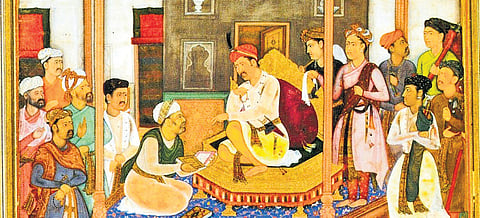Making friends with History
Did you know that the drunk cook of Sir Thomas Roe, the first British ambassador to Mughal court got into a fight with the Governor of Surat? (culinarian’s fate unknown). Jehangir loved to drink, had a curious mind, patronised art and music and was generous to a fault; his son Khurram (later Shah Jehan) erased his father’s legacy in the history books during his rule, a habit of Mughal progeny.
Through 15-odd episodes of Empire—a sweeping podcast about the world’s greatest empires narrated by British historian, radio and TV presenter Anita Anand and author William Dalrymple—we learn how the Raj’s rise and fall is relevant to India in the age of globalisation. Each podcast humanises history: the carriage Roe brought from England as a gift was so ramshackle that Jehangir put in plush upholstery and golden nails.
Detailed commentary backed up by meticulous research and humour sets Empire apart. The minutiae are dazzling: women artists in a Muslim court, Shah Jehan’s diary which conscientiously records the mating habits of his pet cranes, and the mind-boggling wealth of the Mughals. The narrators keep it light without diluting the impact, though Dalrymple sometimes comes across as facetious and Anand humorously patient.
The authenticity of Empire rides not only their reputation but that in each episode, experts like Nandini Das are invited to give the stories depth, and sometimes steer the discussion. History can be academically boring, but not here. Empire’s dark revelation is that nothing damages a social fabric more than religious and racial repressiveness.
It records the somber turn India take after the 1857 uprising; Indian hostility towards evangelical Colonels converting people in bazars, and missionaries who view the ‘natives’ as inferior. A pleasant interactive culture is slowly replaced by bigots. The podcasters attribute the failure of the Mutiny and the plight of the doddering Bahadurshah Zafar to disorganised chaos; nothing has changed in eternal India.
The personal touch from banter to the poignancy is delightfully unexpected in a history narration. Anand’s account of her grandfather, a merchant visiting Amritsar on 14 April 1919 suffering survivor’s guilt because he was away from the Jallianwala massacre site, becomes a family postcard of regret. Irony abounds as cultures meet here: Westerners thought themselves top dogs at the Mughal court while Emperor Akbar was so concerned that he wondered “how do we civilise these savages?’’
In the spite of the contemporary ethos’ efforts to diminish, or in some cases even wipe away India’s Mughal heritage, the podcasters teach us that things are not so simple. The Mughals were not just about conversions, massacre and nautch girls; though that did happen a lot. Theirs was also an Age of Enlightenment, and Mughal courts were living centres of poetry, dance, debates and discussions.
The Empire is a complex story made simpler, of blood, ambition and power. It educates us about how we became what we are today and what we could become tomorrow. Though at times Dalrymple takes the White Mughal trope a tad too far.
Empire
Hosts: William Dalrymple, Anita Anand
Genre: History
Platform: Spotify
Language: English
Rating: 4/5

